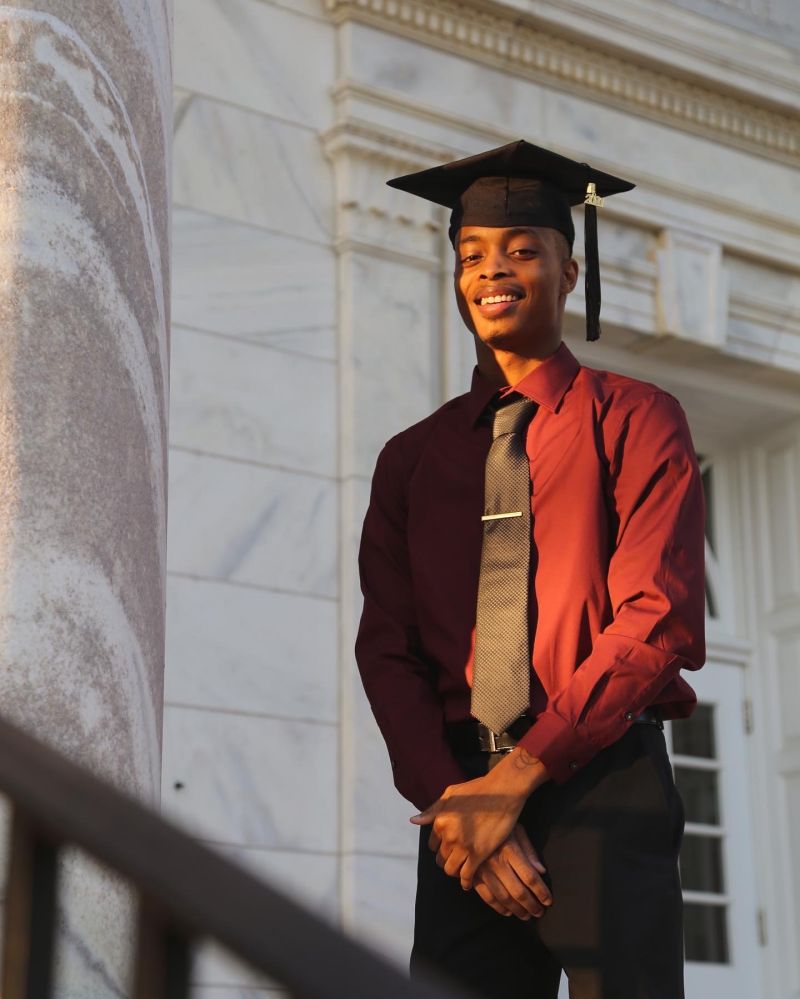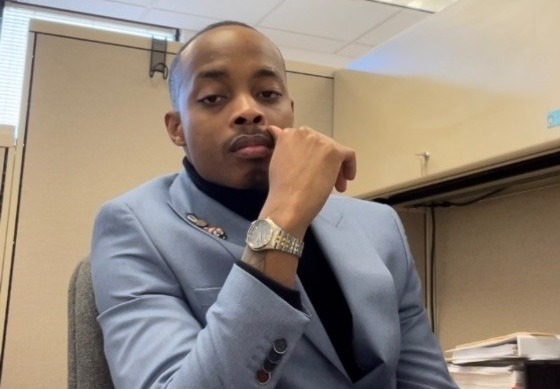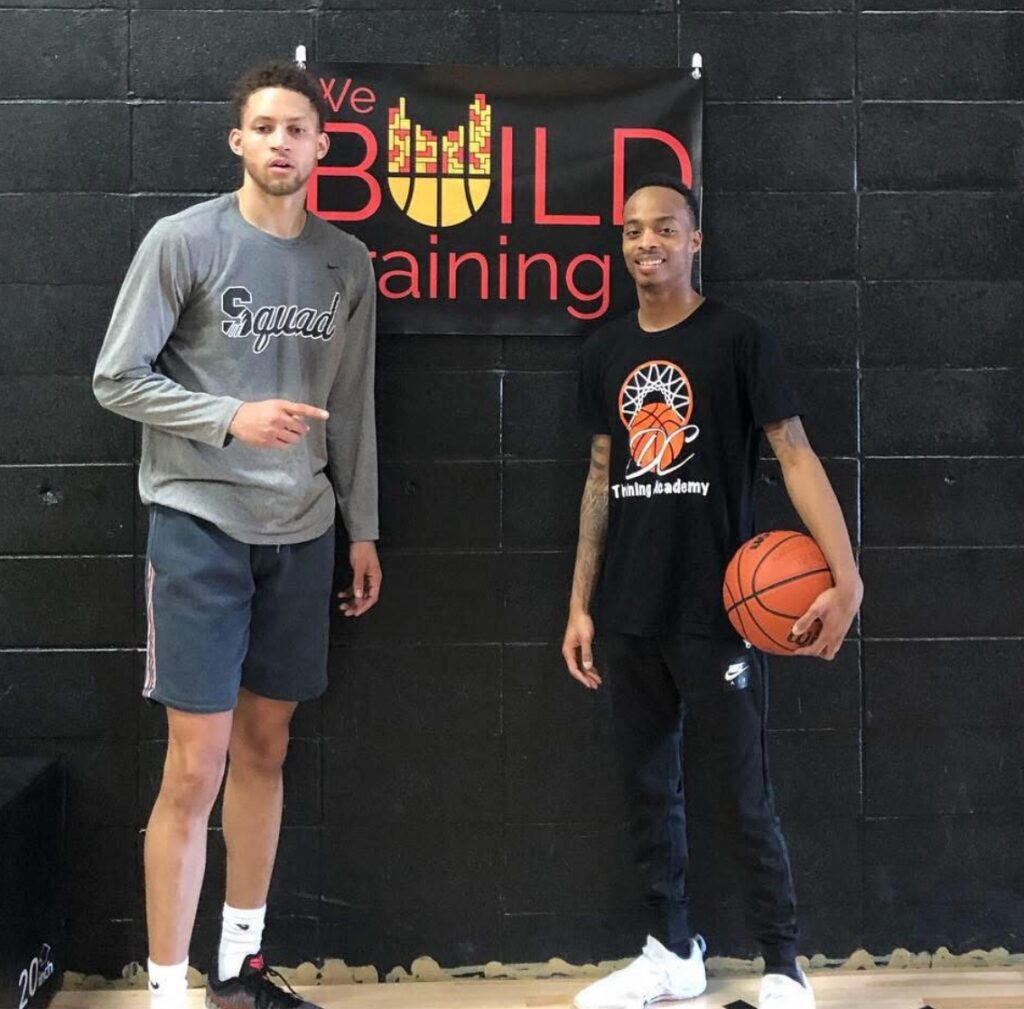Alum applies same skillsets to dual careers as a probation officer & basketball player development coach: “Sports is a microcosm of society”
A Yankees fan who lives in Phillies territory, Devón Coles is no stranger to seeing things differently. A 2021 graduate of the Law & Justice Studies program, Devón intentionally chose an online criminal justice program – it was not a COVID-19-era choice by default.
Assessing situations, analyzing from every perspective and forging the best path forward is what Devón does. He brings these attributes to his professional life, as well as his personal life.
Goal Setting
Devón didn’t intend to go to college to have the quintessential college experience of living in a dorm and joining social clubs on campus. He was a father to a young son, balancing parenthood with his full-time job as an assistant family service worker at New Jersey Department of Children & Families. In addition, he was growing a second career as a basketball player development coach.
With the goal of becoming a probation officer in his mind’s eye, Devón transferred to Rowan University two years after earning an associate degree. ”I knew I wanted to continue on to earn my degree,” he says. “I didn’t feel like the associate’s was enough, knowing what I could put myself through. So I talked to one of the academic advisors here. Her name is Ms. Godfrey. Love her, by the way. I spoke with her and I decided to go to Rowan.” Devón understood that step one of how to become a probation officer was through earning a degree.

Devón says that he was looking for a career that was in the community, something where, “I could help young men and women, whether it’s trying to empower them, give influence or help them out of situations. I knew I had the drive for that.”
Of becoming a probation officer, he says, “I knew that’s what I wanted to pursue. It was just a matter of how I was going to get there.”
Maximizing Opportunities While in School
He got there through perseverance.
For Devón, step two of how to become a probation officer was professional growth and learning through his online criminal justice program. This included taking not only criminal justice classes that were required by his major, but also enrolling in criminal justice classes that he found interesting and felt would benefit his future career.
“Rowan was great. It was a phenomenal experience,” says Devón.
Criminal Justice Internship
“I did an internship with the Juvenile Justice Committee,” he continues. During this year-long experience he served as a panel member evaluating factors to determine alternative options that would be best for the juvenile, as well as reviewing evidence and other pertinent information.
Internship is considered one of the criminal justice classes, so while Devón was gaining pre-professional skills in the field he was also earning three college credits.
Networking
He maximized his opportunities, taking full advantage of learning from an Intensive Supervision Program (ISP) guest speaker brought in by one of his criminal justice class’s professors, getting the speaker’s email.
Online criminal justice program students also connect with classmates through shared camaraderie and interests, learning from one another through discussion board questions and group projects.
Criminal Justice Classes
In addition to his internship, Devón immersed himself in criminal justice classes that fueled his growth toward his goals, taking courses such as:
- American Government
- Introduction to Juvenile Justice
- Social Problems
- Introduction to Corrections
- Survey of Criminal Justice
- International Terrorism
- Theories of Crime
- Criminal Justice Research
Transition from Student to Professional
Three months after graduation, Devón accepted a position with New Jersey Courts as a court services officer, one step closer to his professional goal.
Five months later, Devón achieved his professional goal: he started a new job as an adult probation officer through New Jersey Courts.
Three years later, he accepted a promotion to court services officer 2, a role he has now held for almost a year.

How to Become a Probation Officer
Specific requirements and steps on how to become a probation officer vary by state. In Devón’s state (New Jersey), some of the criteria on how to become a probation officer includes:
Meet Basic Requirements & Criteria
- Authorized to work in the United States (U.S. citizenship is not a requirement)
- Have a valid driver’s license if driving is necessary to perform essential duties of the position
- Have a bachelor’s degree in a relevant field, such as criminal justice, psychology, sociology, business or public administration
- Complete a criminal background check
- Adhere to the residency law, which requires newly hired employees within the Judiciary to live in New Jersey within one year of being hired
In addition, it is typical for probation officer applicants to be required to pass a written exam, psychological screening, physical agility and a drug screening to become hired.
What Does a Probation Officer Do?
Devón dispels the notion that probation is about catching people doing something wrong, with the goal of sending people back to jail. “That couldn’t be further from the truth,” he says.
Managing a caseload of approximately 120 clients, Devón describes probation work as “a job that borders along social work,” with the main goal of keeping clients out of trouble.
What is Probation?
Probation is an alternative to incarceration. Probation officers supervise clients to help them build healthier lives that, in the short-term, keep them in compliance with court orders. Long-term, the support and guidance that probation officers provide help clients to live lives in society that keep them on the right side of the law. The job is as much about rehabilitation and connecting clients to resources as it is about monitoring and reporting.
Job Duties of a Probation Officer
A brief overview of a probation officer’s job duties, with a more comprehensive list on NJ.gov, includes:
- Prepare and maintain case folder for each assigned client
- Gather information about clients’ backgrounds by talking to them, their families and friends
- Interview clients regularly to evaluate their progress in accomplishing goals and maintaining the terms specified in their probation contracts and rehabilitation plans
- Discuss with clients how issues such as drug and alcohol abuse and anger management problems might have played roles in the behaviors that led to probation
- Arrange for medical, mental health or substance abuse treatment services according to individual needs or court orders
- Develop liaisons and networks with other agencies and professionals to plan for helping offenders with life adjustments
- Administer drug and alcohol tests to verify compliance with substance abuse treatment programs
- Write reports describing clients’ progress
- Develop and prepare packets containing information about social service agencies, assistance organizations, and programs that might be useful for clients
Building Trust With Clients
Of building a rapport and a connection with clients that develops the trust needed to support them, Devón says, “It’s a lot of hard work.”
Probation officers need to look beyond the convictions and see the totality of the person in front of them. Devón shares, “It’s, ‘hey, how’s your relationship with your parents? Your friends? How’s your social life? How are your kids?’” He emphasizes, “It’s not just ‘okay, make sure you’re home at this time or make sure you get this job,’” to stay compliant.

Rewarding Moments as a Probation Officer
“It’s a phenomenal opportunity,” Devón says of working as a probation officer, sharing, “You meet a lot of different people – that’s on the law enforcement side, supervisors, coworkers, even the clients.”
Devón describes working with clients as, “It’s a give and take relationship.” Human nature being what it is, some clients are more compliant than others, but it’s all a part of the ebb and flow of the job and is to be expected.
Looking beyond the court paperwork to see the complete person in front of him, Devón looks at the big picture and how his role can enhance each client’s life. “You have your people where you’ve got to be a little more on them,” he explains.
“You realize that sometimes they need that,” he says. “Just like the kid in school where the teacher has to be on them to get to a certain point, it’s like that with adults, too, because they probably didn’t have this structure growing up.”
Naturally, what Devón finds most rewarding are the successes, the wins, the folks who reintegrate into society and live happily ever after.
“It helps when they come back and they tell you, ‘You actually helped me to get where I am,’” he says.
It’s moments like these that warm his heart. It’s the client who he gave a job application to who later left a voicemail for him, ‘I’m at the job interview, I got it. Thank you Mr. Coles, I really appreciate it.’ It’s sending an email to a client telling them that he’s proud of them and happy for them, and the client replies ‘Wow, I never heard that before. Thank you.’
“The joy in it, when you see those success stories – that’s what really, really matters,” Devón says.
Earning a Promotion
After three years as an adult probation officer, Devón earned a promotion to court services officer 2 and transitioned out of probation work and into pretrial services.
The key difference between the two roles is the timing of the supervision. Within pretrial services, a court services officer assesses clients when they are defendants, making recommendations to judges on pretrial release. In contrast, an adult probation officer monitors and supports clients after they have been convicted by the court.
He brings the same skillsets and compassion to this new role, supporting clients at a different stage of their interactions with New Jersey Courts. He still monitors and enforces the conditions of the court, still connects clients with resources and support.
However, instead of going in the field visiting clients’ homes to monitor and assess, in this new role clients report to him while he is in the office. Clients are welcome to check in with Devón through phone or video calls.
Devón Coles Training Academy
A basketball player development coach for eight years, Devón incorporated Devón Coles Training Camp five years ago. He provides private training and runs camps weekly and year-round from his Runnemede, NJ, location.
He started this journey through Clarence Jackson of CJ Skills Academy. Devón observed how Clarence trained basketball players, and Clarence brought Devón to basketball camps and gave him the opportunity to be a camp counselor.
Devón then continued his learning under Demetrius Briggs from We Build Hoops. “I can’t say enough about him,” Devón says. “He was, and to this day is, a very integral part of my coaching, in my life. Period.”
Building this second career was happening simultaneously as he earned his criminal justice degree online from Rowan University, working full time and raising his son.

Integrating Probation & Basketball
Instead of viewing these facets of his life as distinctly different from one another, Devón integrates them into one whole.
He references his role as a probation officer to the basketball players he trains. “I’ve used that in some of my speeches to them before,” he says. “Like ‘hey, I’m a basketball trainer, but I’m also a probation officer. So I can give you some experiences of these adults who didn’t have this structure as a kid.”
He takes a similar approach with his basketball clients as he does with his probation and pretrial services clients, building rapport and relationships to build trust that leads to achieving goals.
With both sets of clients, it’s not checking the boxes to get people from one level to the next. Devón understands that it’s more than that. He understands that it’s important to view a person as the whole person they are, instead of viewing them through the lens of defining them by the reason they’re in front of him: court defendant or basketball player.
To connect with his players on a human level, he sends them inspirational movies, documentaries and shows they can watch. He asks them, ‘How was your day in school? How was prom? How was your birthday?’ sharing that “little things like that go a long way,” he says.
Connecting students with resources looks different than what he does within New Jersey Courts, but follows a similar sentiment. “A couple of the kids that I trained are now in college. I invite them to come back to speak to the kids in high school now, to tell them about their journey, tell them about where they were as a player when they played,” he says. “[It’s about] keeping those connections there. It’s basketball first because that’s what the connection is through initially, but you slowly realize you have something with these kids, or you’re at graduations, they’re texting you.”
Lasting Words of Wisdom
“Sports is a microcosm of society. It teaches you how to persevere. How are you going to deal with adversity? It does translate into life. I try to tell these kids all the time, ‘hey, it may seem like it’s a basketball game right now, but this is real life.’”
Through both of his careers, Devón meets people where they are and champions their success.
About Rowan University’s Online Criminal Justice Major
Rowan University’s online criminal justice major, a bachelor’s degree in Law & Justice Studies, is designed for working professionals ready to advance their careers or enter the justice field with confidence. Through courses in criminal law, ethics, law enforcement, corrections and legal research, students build the knowledge and skills needed to navigate today’s complex justice system. The fully online format provides the flexibility to balance coursework with work and life responsibilities, while applied projects and real-world case studies connect learning directly to professional experience. With expert faculty and a focus on leadership, integrity and service, graduates are prepared to move forward in careers across law enforcement, public policy, corrections and beyond.
Alumni Success Stories
Explore how our alumni propel their Rowan University education into lasting success, as highlighted through our alumni success series. From Rowan University student to lifelong member of the Rowan University Alumni Association, Rowan Profs thrive at every stage of their journey. Go Profs!
Internship & Experiential Learning Stories
Learn how Rowan Profs go Beyond the Classroom to grow professionally, as well as personally, through internships and other experiential learning. Experiential learning includes hands-on learning opportunities provided through research, student clubs, campus leadership, student worker jobs, service-learning projects and volunteerism. In addition, Rowan’s Office of Career & Professional Development provides career support that’s more than just advice – it’s events, connections and real guidance to help students thrive after college.

